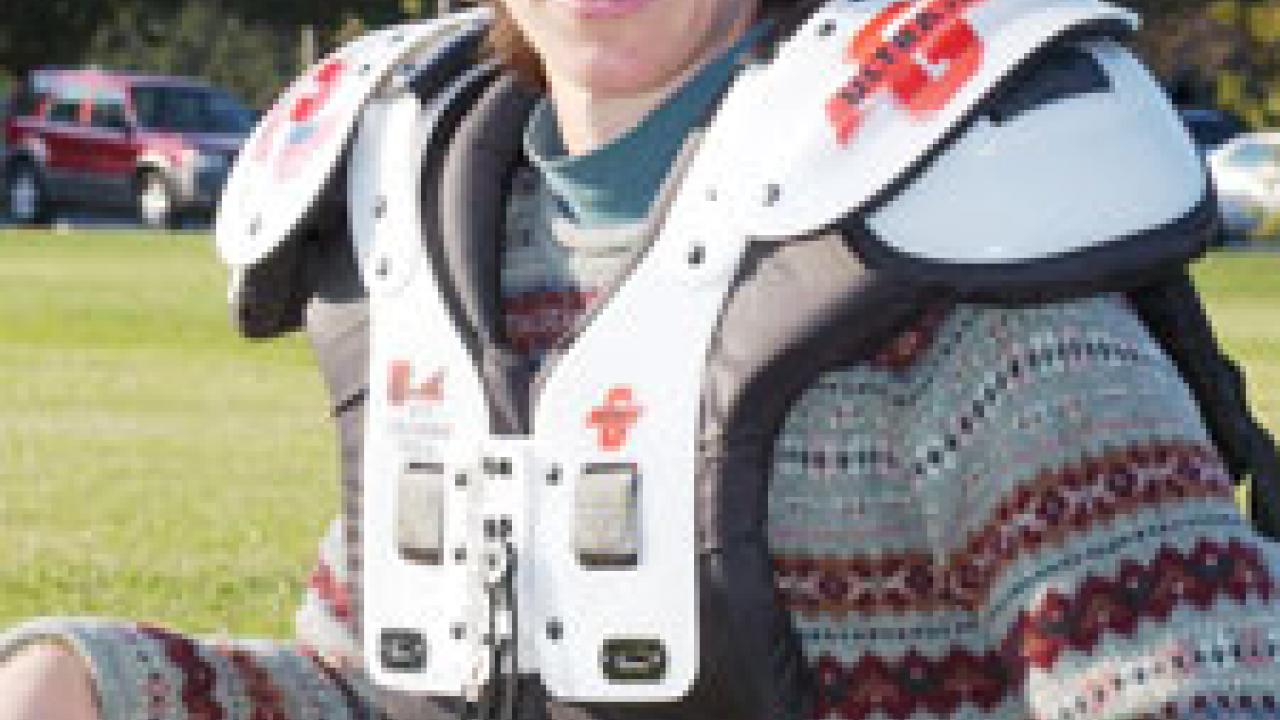When Anne Canfield steps on the gridiron, it's not for powder puff or flag football.
It's for full-contact football, with NFL rules, shoulder pads and helmets.
Canfield, a staff research associate at the Primate Center's pathology unit, is unafraid and unforgiving about bone-rattling hits, clashing helmets and bruising tackles. That's just the game, and sometimes you get thumped like a toy drum.
Canfield has worn the pads the last two years for the Sacramento Sirens, a 3-year-old women's professional football team in the Independent Women's Football League. The Sirens won the national championship last July, overcoming the New York Sharks 41-30 in New York City.
"It's more intense than I even imagined," said Canfield. "Originally, I thought, 'women playing tackle football, is that going to be funny somehow?' But it's scary."
She added, "You can hear the hits way up in the stands."
At 5-foot-7 and 130-pounds, Canfield, is a defensive back who relies more on speed and agility than smash-mouth size. She plays with other Sirens ranging from 18 to 42 years old and from 120 to 260 pounds.
Canfield, 41, played wide receiver her first season, and switched to defense last season.
"I wanted to see what it felt like to play on both sides of the ball," Canfield said. "I'd rather tackle someone than get tackled."
The Sirens will hold a rookie mini-camp Nov. 22, with the season beginning next March. Their home games are played at Capitol Christian High School in Sacramento.
"I challenge any woman who thinks she's a good athlete to try out," said Canfield, noting that tryouts include a 20-yard dash; 40-yard dash; agility course; weight lifting; and drills in passing, receiving and kicking.
Canfield has always enjoyed sports -- swimming, tennis and basketball, especially. She didn't indulge her athleticism at Chico State ("other distractions"). But now her two children, Max, 11, and Valerie, 8, watch from the stands as their mom roughs up runners and receivers. "They think it's great," she said. "They bring their friends to watch."
Women playing football is not a recent development. Since the 1920s the NFL has used women's football teams as a novelty halftime act. The Sirens are one of more than 125 such women's professional football teams playing in eight leagues in the United States. It's not mainstream but a labor of love for those involved -- owners as well as players. Canfield and the other Sirens have to pay for their own uniform and equipment, and they receive a paltry $25 for their season-long efforts -- but that payment technically qualifies them as professional.
Says Canfield, "I wish it was 20 years ago and I'd be in prime shape for women's football. Like some of the others, I'm competing with women in their early 20s. I admit, I get sore after games."
Canfield lives in Woodland and is married to Don Canfield, a veterinarian at the primate center. "He comes to all my games and has all the gear -- hat, jersey -- with my name on it." Both of them work in the pathology unit where, yes, they met.
Why did you choose a career in primate research?
For a while there I thought of going to law school. I had majored in international affairs at Chico State. But animals interested me from the beginning, and one day I decided to become an animal health technician. I came to work at UC Davis, served at the raptor center for a while, and then wound up here at the primate center. Our primary goal here is to conduct research focused on human health.
What's the biggest issue in your field today?
It's advancing the cause of human health by better understanding how diseases affect animals.
What do you like most about your job?
The knowledge that our research may help people with any number of diseases, including cancer, asthma, AIDS, osteoporosis, neurodegenerative diseases, and problems associated with infant development and nutrition.
The least?
We have a large monkey breeding program at the primate center. Some days it's really hard to put an animal to sleep. No one enjoys doing it, believe me. But it's important to keep the big picture in mind and realize the tremendous benefits that come to human health by learning how disease works in primates.
Read any good books lately?
I've been reading a collection of essays about war and the 21st century. My interest in politics is reflected in my reading choices, and I especially love international affairs and how history shapes nations and peoples.
What's something surprising about you that people don't know?
I love growing bonsai trees. I have a few that are still living (chuckle).
What's one of your most treasured possessions?
My bright red 1997 Ducati 916. It's big, fast and powerful. I love riding motorcycles.
What's your guilty pleasure?
Pushing the limits of my Ducati on the highway. That's an indulgence.
Media Resources
Clifton B. Parker, Dateline, (530) 752-1932, cparker@ucdavis.edu
